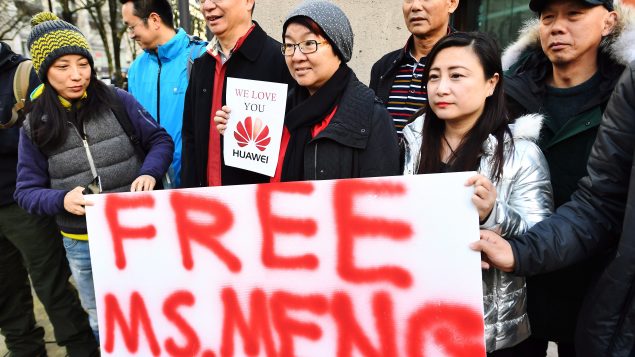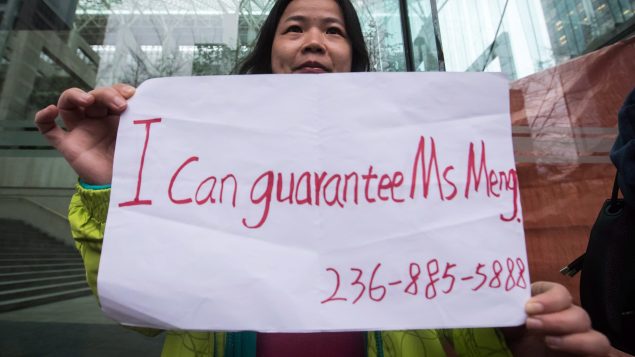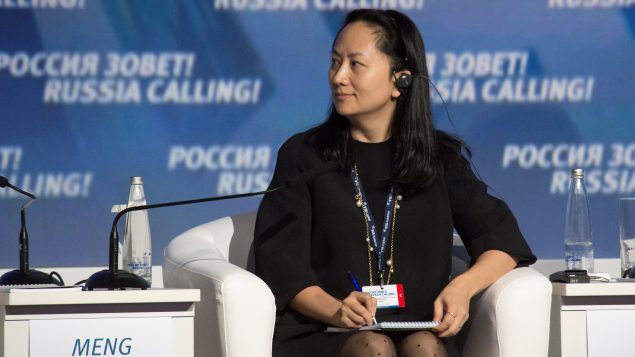A jailed executive of Chinese telecom giant Huawei smiled and wiped tears Tuesday as a Canadian court granted her bail following a gruelling three-day hearing in Vancouver.
Meng Wanzhou, who is Huawei’s chief financial officer and the daughter of founder Ren Zhengfei, was ordered to post a $10-million bail, including a cash deposit of $7 million.
Meng, who was arrested in Vancouver earlier this month at the request of U.S. authorities, will have to surrender her passports and also abide by more than a dozen conditions imposed by the court.
These include respecting a curfew, having to wear a GPS tracking device at all times and being monitored round-the-clock by a security team that she has to pay herself.
Meng will also have to respect a curfew and will be allowed to move only within a strictly defined area of the city.
Meng, 46, could face extradition to the U.S. over allegations she was involved in violating sanctions on Iran, with each charge carrying a maximum sentence of 30 years in prison.
Justice William Ehrcke said the United States government has 60 days to present a formal extradition request from the moment of Meng’s arrest at the Vancouver airport on Dec. 1.
Canada then has a further 30 days to determine whether to issue an Authority to Proceed with the extradition hearing. Should an Authority to Proceed be issued, an extradition hearing will be scheduled by the British Columbia Supreme Court.
If no extradition request is received by Jan. 30, 2019, Meng must be freed, Ehrcke said.
Meng’s next court appearance is set for Feb. 6, 2019.
‘A Chinese corporate national champion’

People hold a sign at a B.C. courthouse prior to the bail hearing for Meng Wanzhou, Huawei’s chief financial officer on Monday, December 10, 2018. (Jonathan Hayward/THE CANADIAN PRESS)
Her bail hearing began in Vancouver on Friday.
Canadian government prosecutor John Gibb-Carsley said the U.S. Justice Department has flagged her as a possible flight risk and asked the court to deny bail to Meng, citing the enormous financial resources at her disposal.
Meng’s lawyer David Martin told the court on Monday that given her high profile position “of a Chinese corporate national champion” his client will never skip bail as doing so would “embarrass China itself.”
Meng also said in a sworn affidavit that she’d suffered numerous health problems, including surgery for thyroid cancer in 2011, and had to be treated at a Vancouver hospital for hypertension after her arrest.
“I continue to feel unwell and I am worried about my health deteriorating while I am incarcerated,” Meng said in the 55-page affidavit.
No-holds-barred fight

A supporter holds a sign outside B.C. Supreme Court during the third day of a bail hearing for Meng Wanzhou, the chief financial officer of Huawei Technologies, in Vancouver, on Tuesday December 11, 2018. (Darryl Dyck/THE CANADIAN PRESS)
Martin also argued that Meng, a former permanent resident of Canada, has strong connections to the country and will remain in Vancouver where she owns two multi-million-dollar houses along with her husband and her daughter, while her case proceeds.
Martin proposed putting Meng under round-the-clock electronic and physical surveillance to assuage fears that she might skip bail.
Meng’s husband, Liu Xiaozong, told the court he was ready to move to Canada and post a 15-million-Canadian-dollar (11.2-million-US-dollar) bail and act as a community surety.
Meng’s arrest, which occurred on the same day that US President Donald Trump and Chinese President Xi Jinping met after the G20 summit in Buenos Aires to discuss their trade war, has escalated tensions between Beijing, Ottawa and Washington.
Beijing seemingly upped the ante on Tuesday by arresting a former Canadian diplomat after threatening that Canada will suffer “serious consequences” if it doesn’t release Meng.
Michael Kovig’s arrest raised the stakes for Canada and was interpreted by most observers as part of a no-holds-barred Chinese strategy to prevent Meng’s extradition to the U.S.







For reasons beyond our control, and for an undetermined period of time, our comment section is now closed. However, our social networks remain open to your contributions.